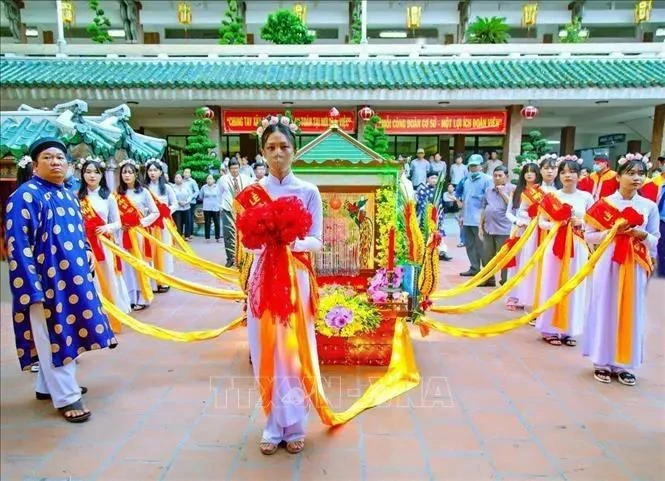An Giang's festival recognised by UNESCO as Intangible Cultural Heritage of Humanity
The Ba Chua Xu (Holy Mother of the Realm) Festival on Mount Sam in the Mekong Delta province of An Giang was officially recognised by UNESCO as Intangible Cultural Heritage of Humanity, at the 19th session of the Intergovernmental Committee for the Safeguarding of the Intangible Cultural Heritage in Paraguay on December 4.
 |
| The Ba Chua Xu (Holy Mother of the Realm) Festival on Mount Sam in the Mekong Delta province of An Giang. |
The festival has been preserved and practised for generations in Chau Doc of An Giang province. It is held from the 22nd to the 27th of the fourth lunar month, at the Ba Chua Xu Temple on Mount Sam and the stone pedestal on the mountain to worship the Holy Mother.
It reflects the culture of Vietnam’s southerners as well as cultural exchange and blending with the Khmer, Chinese, and Cham communities. The festival honours Ba Chua Xu and serves as a time for local residents to express their gratitude and respect for those who have rendered service to the nation. In 2014, it was recognised as National Intangible Cultural Heritage by the Vietnamese Ministry of Culture, Sports, and Tourism.
Speaking at the session, Permanent Deputy Minister of Foreign Affairs Nguyen Minh Vu, who is also Chairman of the Vietnam National Commission for UNESCO, noted that the UNESCO recognition highlights Vietnam’s diverse and long-standing culture.
This acknowledgment significantly contributes to efforts in preserving and promoting cultural heritage at both national and international levels, he said, stressing as Vice-Chair of the General Assembly of the State Parties to the 2003 Convention for the Safeguarding of the Intangible Cultural Heritage, Vietnam is committed to preserving and promoting this heritage and other heritages for future generations.
Le Hong Quang, Secretary of the An Giang provincial Party Committee, pledged to work with local people to protect and enhance the cultural values of this heritage, ensuring its alignment with sustainable development goals.
With this recognition, the festival has become the 16th intangible cultural heritage of Vietnam recognised by UNESCO. It is the second intangible cultural heritage in the southern region, following the Don Ca Tai Tu (southern amateur traditional music), and the first traditional festival in the South to receive this honour.
The recognition is the result of concerted efforts and close collaboration among the An Giang provincial authorities, heritage experts, and the Ministry of Culture, Sports and Tourism. The Vietnam National Commission for UNESCO, along with the Ministry of Foreign Affairs and the Permanent Mission of Vietnam to UNESCO, played a crucial role in proposing, refining, and advocating for this nomination.
The 19th session of the Inter-Governmental Committee for the 2003 Convention for the Safeguarding of Intangible Cultural Heritage of UNESCO is scheduled to last until December 7 in Asunción, Paraguay. It gathers nearly 1,000 delegates from 120 member countries to discuss key issues related to intangible cultural heritage. It plans to add 63 new entries to the global list of intangible cultural heritages.
VNA





READER COMMENTS